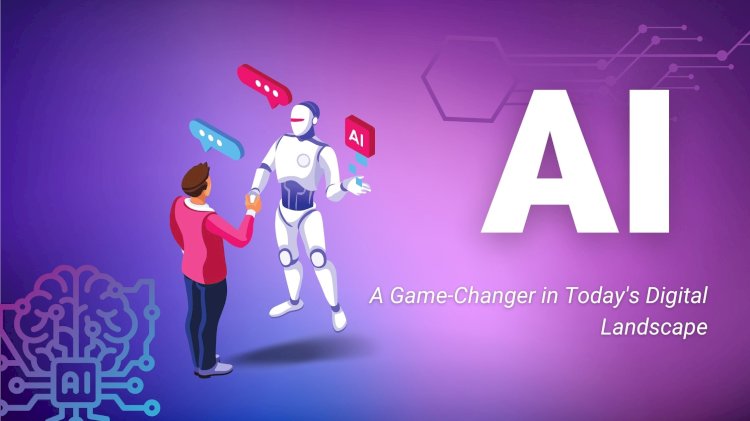AI: A Game-Changer in Today's Digital Landscape
Artificial Intelligence (AI) is revolutionizing industries and transforming our daily lives. It has applications in healthcare, finance, transportation, and education, improving efficiency and decision-making. AI-powered systems analyze medical data for early diagnosis and personalized treatments, detect fraud patterns in finance, and enhance road safety with autonomous vehicles. While AI offers increased efficiency, enhanced decision-making, and improved safety, it also presents challenges. Job displacement and ethical concerns are areas of consideration. However, recent inventions like GPT-3 and AlphaFold, along with advancements in reinforcement learning, showcase the potential of AI. The future of AI holds promises such as enhanced personalization, smarter homes and cities, and AI-assisted technologies for disabilities. By embracing AI's potential responsibly, we can create a future where humans and machines collaborate to solve complex problems and enhance our lives.
By Shreya Rajvanshi Gangal

Artificial Intelligence (AI) has rapidly emerged as a revolutionary technology, transforming numerous industries and impacting our daily lives in ways we couldn't have imagined before. With its ability to mimic human intelligence and learn from vast amounts of data, AI holds the potential to revolutionize various sectors, ranging from healthcare and finance to transportation and entertainment. In this article, we will explore the uses, pros and cons, recent inventions, new research, and the future of AI, as well as its impact on our daily lives.
Uses of Artificial Intelligence:
AI has found its application in countless domains, significantly enhancing efficiency, accuracy, and decision-making capabilities. Some prominent uses of AI include:
- Healthcare: AI-powered systems can analyze vast amounts of medical data, aiding in early diagnosis, personalized treatment plans, and drug discovery. Additionally, AI-assisted robotic surgeries have improved precision and reduced recovery time.
- Finance: AI algorithms can detect fraud patterns, assess credit risks, and make real-time trading decisions. AI-driven chatbots provide customer support, enhancing user experience and reducing costs.
- Transportation: Autonomous vehicles, enabled by AI, have the potential to revolutionize transportation by improving road safety, reducing traffic congestion, and enhancing fuel efficiency.
- Education: AI-based tutoring systems and personalized learning platforms can adapt to individual student needs, providing tailored educational experiences.
Pros and Cons of Artificial Intelligence:
Like any transformative technology, AI possesses both advantages and challenges. Let's explore some pros and cons:
Pros:
- Increased Efficiency: AI automates repetitive tasks, leading to increased productivity and efficiency across various industries.
- Enhanced Decision Making: AI systems can analyze vast amounts of data, extract insights, and assist in making informed decisions, aiding professionals in numerous fields.
- Improved Safety: In sectors such as healthcare and transportation, AI technologies can enhance safety standards by minimizing human error.
Cons:
- Job Displacement: Automation driven by AI may result in job losses or changes in the job market, requiring the workforce to adapt to new roles.
- Ethical Concerns: AI raises ethical questions, including privacy concerns, algorithmic bias, and the potential for misuse of AI technologies.
- Lack of Human Intuition: While AI can analyze data and make decisions based on patterns, it lacks human intuition and emotional intelligence.
New Inventions and Research:
AI research and innovation are thriving, leading to remarkable breakthroughs. Some notable recent inventions and research include:
- Generative Pre-trained Transformer 3 (GPT-3): GPT-3, developed by OpenAI, is one of the most advanced language models, capable of generating human-like text and engaging in intelligent conversations.
- DeepMind's AlphaFold: AlphaFold, an AI system, has revolutionized protein folding prediction, significantly advancing drug discovery and our understanding of biology.
- Reinforcement Learning: Researchers have made significant strides in reinforcement learning, enabling AI systems to learn complex tasks through trial and error, leading to advancements in robotics and gaming.
The Future of AI and Its Impact on Daily Life:
The future of AI holds immense possibilities. Here are some key areas to watch:
- Enhanced Personalization: AI will continue to shape personalized experiences, from tailored healthcare treatments to personalized entertainment recommendations.
- Smarter Homes and Cities: AI-powered smart home devices and smart city infrastructure will enable more efficient resource management, energy conservation, and improved quality of life.
- AI in Assistive Technologies: AI will play a crucial role in assisting people with disabilities, providing innovative solutions for improved accessibility and independent living.
- Ethical AI Development: As AI advances, there will be an increased focus on ethical guidelines, responsible AI development, and ensuring fairness, transparency, and accountability.
In conclusion, Artificial Intelligence is revolutionizing our lives, offering tremendous opportunities to transform industries and improve daily experiences. While it comes with challenges and ethical considerations, the benefits of AI are far-reaching. By embracing AI's potential, we can harness its power to create a more intelligent and efficient future, where humans and machines work together to tackle complex problems and improve the quality of our lives.
What's Your Reaction?



















